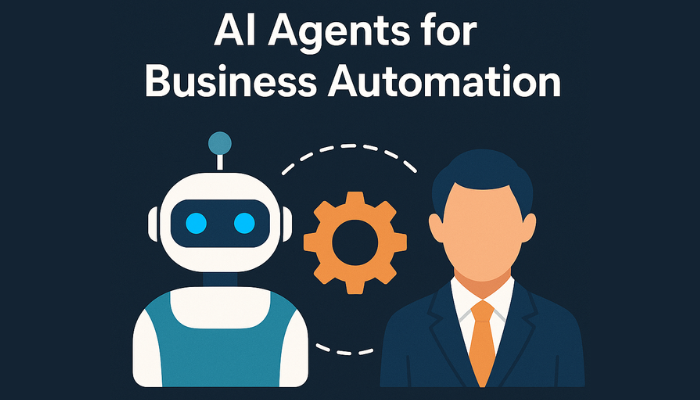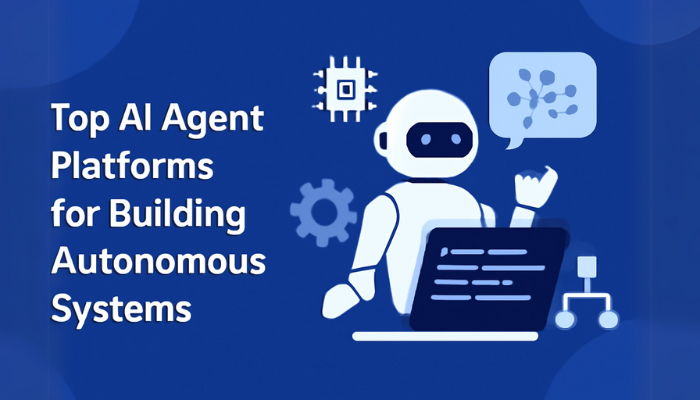“Automation applied to an inefficient operation will magnify the inefficiency.”
— Bill Gates
That’s the warning, and the opportunity. Business processes are often complex, repetitive, and prone to human error. Automating them blindly can create more problems than it solves. But AI agents are changing the game. Unlike traditional automation, AI agents bring intelligence, context-awareness, and adaptability to the table, making automation smarter, not just faster.
These agents handle tasks like customer support, lead qualification, invoice processing, data entry, and internal ticket triage, all with speed and precision. Instead of hardcoding every step, AI agents learn, adapt, and collaborate across tools and systems. The result is less chaos, fewer errors, and more time for your team to focus on growth, strategy, and innovation.
In today’s fast-moving market, efficiency is no longer optional — it’s survival. This blog will show you how AI agents can streamline your operations, walk through real-world use cases, and give you a practical action plan with a vendor checklist. Let’s get started.
What Are AI Agents for Automation?
In simple terms, AI agents are highly skilled virtual employees who work autonomously, handling tasks without constant supervision. These intelligent systems observe data, make decisions, and take actions that help your business run more smoothly. Think of them as decision-making powerhouses; constantly learning, adapting, and improving.
Here’s how AI agents power automation at every step:
- Data Sensing: AI agents don’t passively wait — they’re programmed to respond to defined signals. These triggers can come from user actions, system updates, or scheduled tasks. For example, an AI agent monitoring inventory can detect when stock drops below a threshold and initiate reordering, without waiting for a human to notice.
- Decision-Making: Once triggered, the agent analyzes incoming data using machine learning models or rule-based logic. Instead of hardcoded scripts, they evaluate variables to choose the best next action. This is how they automate smart responses; like prioritizing support tickets based on sentiment or urgency.
- Task Execution: After deciding what needs to be done, the agent executes the task automatically; updating records, sending alerts, triggering other systems, or even conversing with users. These actions form the core of process automation, reducing manual effort while ensuring accuracy and speed.
For more: Understanding AI Agents: A Comprehensive Guide
Now that you know what AI agents can do, let’s break down the different types and see how each one can boost your business in unique ways.
Which AI Agent Fits Where?
Not all AI agents are created equal. Each type is designed for a different kind of decision-making. Here’s a clear breakdown so you know exactly what fits your business needs.
a) Simple Reflex Agents
These follow direct if-then instructions. No context, no learning, just instant reaction.
- Use Case: In eCommerce, these agents send order confirmation emails the second a purchase is completed. A trigger (order placed) prompts an action (email sent).
- Why it works: It’s fast and dependable for repetitive tasks that don’t require thinking, perfect for basic automations where consistency is key.
b) Model-Based Reflex Agents
They track what’s going on in real time and act based on the current situation, not just a static rule.
- Use Case: In logistics, these agents monitor warehouse inventory and reorder stock when levels drop, factoring in delivery times and recent demand surges.
- Why it works: They bring context-awareness, which makes them reliable in changing environments where static rules can’t keep up.
c) Goal-Based Agents
They decide what to do by evaluating which actions move them closer to a specific goal.
- Use Case: In customer support, they route tickets to the right agent based on issue type, urgency, and team bandwidth, optimizing for fastest resolution.
- Why it works: They make smart decisions dynamically, always aligning action with the bigger business objective.
d) Utility-Based Agents
They evaluate multiple outcomes and pick the one with the highest payoff.
- Use Case: In performance marketing, these agents shift ad spend across platforms (like Google, Meta, and LinkedIn) in real time, depending on which channel is delivering better cost-per-click or conversion rates.
- Why it works: They’re best when there’s no single right answer, just better ones.
e) Learning Agents
They improve over time using data from past actions to refine future ones.
- Use Case: In financial fraud detection, they study transaction patterns and learn to flag new, emerging fraud types, without being explicitly programmed for them.
- Why it works: They’re adaptable. The more data you feed them, the sharper and more effective they get.
f) Hierarchical Agents
Think of these as smart coordinators, they break large tasks into smaller ones and delegate each.
- Use Case: In employee onboarding, one agent collects documents, another sets up IT access, and another schedules training, each working independently but in sync.
- Why it works: They simplify complexity by handling multi-step workflows efficiently without bottlenecks.
Now that you know which AI agent fits your needs, let’s explore their core capabilities and impact.
Core Capabilities and Business Impact of AI Agents
AI agents aren’t just another tech trend. They’re becoming foundational to how modern enterprises operate. Accenture, for instance, is actively developing over 50 industry-specific AI agent solutions using NVIDIA’s cutting-edge reasoning models. By year-end, that number is expected to hit 100. These agents, built on NVIDIA AI Enterprise, are already transforming workflows in telecom, finance, insurance, and more, by automating decisions, reducing friction, and delivering business results faster than ever.
What’s powering this shift? A set of core capabilities that allow AI agents to operate with autonomy, intelligence, and adaptability. Below are the capabilities that truly matter, and the business value they drive.
1. Autonomous Operation
One of the most powerful features of AI agents is their ability to operate autonomously. Once they’re trained and configured, these agents don’t require constant supervision or manual intervention. They respond to predefined triggers, make decisions based on real-time data, and execute tasks, all on their own. Whether it’s sending follow-up emails, processing refunds, or updating CRM systems, they keep workflows running smoothly.
- What it means for you: Automate customer onboarding, handle inventory alerts, or manage appointment bookings, all in real-time, 24/7. You get uninterrupted operations and zero lag.
- Why it matters: Businesses can scale without scaling people. This is especially critical in sectors like e-commerce or customer service where round-the-clock support isn’t optional.
2. Contextual Perception
These agents pull data from multiple sources; emails, CRMs, cloud platforms, IoT sensors, and understand the situation, not just the input.
- What it means for you: An AI agent responding to a customer email doesn’t just read the text, it cross-references past orders, support tickets, and account history before replying.
- Why it matters: Relevance is key. Context-aware agents improve accuracy, reduce response time, and minimize back-and-forth, directly impacting customer satisfaction.
3. Cognitive Reasoning
AI agents aren’t guessing. They process data using decision trees, algorithms, and rules to reason through the next best step.
- What it means for you: In compliance-heavy sectors like finance or insurance, agents can assess forms, flag anomalies, or approve requests by comparing real-time inputs to regulatory rules.
- Why it matters: You don’t just get automation, you get intelligent automation. This ensures actions are both fast and compliant.
4. Goal-Oriented Action
AI agents are wired to meet defined objectives. They break down complex processes, whether it’s generating a report or moving data across tools, and see it through to completion.
- What it means for you: Imagine an agent that checks incoming leads, qualifies them using preset rules, logs them into Salesforce, and triggers follow-up emails, without your sales team lifting a finger.
- Why it matters: This directly shortens lead cycles, boosts conversion rates, and creates a predictable, automated pipeline across teams.
5. Adaptive Learning
AI agents aren’t static rule-followers, they are designed to learn and evolve. Through mechanisms like feedback loops, pattern recognition, and analysis of historical data, these agents improve their decision-making over time. They identify what worked, what didn’t, and adjust their actions to become more accurate and efficient with each cycle.
- What this means for your business: An AI agent that once misroutes a query won’t repeat the same mistake. It uses feedback, error patterns, and user behavior to self-correct, no reprogramming needed. Over time, it aligns better with your specific workflows and customer needs.
- Why this matters: You’re not just automating, you’re building a smarter system that improves with use. This reduces downtime, minimizes human intervention, and compounds efficiency gains as usage grows.
Business Outcomes You Can Expect
By leveraging these capabilities across your organization, here’s what you unlock:
- Reduced Operational Load: Free up your team by letting AI handle the repetitive grunt work; data entries, email sorting, and basic service tickets.
- Accelerated Throughput: Cut processing times in areas like customer onboarding, procurement, and compliance, where delays usually stack up.
- Lowered Costs: With fewer manual errors and less need for human intervention, you’ll spend less on rework and support.
- Smarter Decisions: Get real-time recommendations and predictive insights from your workflows, helping you plan with precision, not guesswork.
- Scalable Efficiency: AI agents don’t slow down when the workload doubles. Whether you’re processing 10 or 10,000 requests, they scale effortlessly.
- Enhanced Experience: From quicker responses to hyper-personalized service, customers feel the difference, leading to higher satisfaction and loyalty.
AI agents are already proving their worth in high-stakes, high-volume environments. As more businesses adopt them, the question isn’t “should we?”, it’s “how fast can we?”
Now that you know the benefits, let’s look at where AI agents shine the most.
Popular Use Cases for AI Agents in Business Automation
AI agents for automation are actively being explored and implemented. In fact, 26% of leaders in a Deloitte survey said their organizations are seriously investing in autonomous agents. Here’s a closer look at where AI agents for workflow automation are quietly transforming day-to-day operations behind the scenes:
1. Automated Sales Follow-Ups
Forget sticky notes and missed reminders, AI agents stay on top of every lead like clockwork. They send timely follow-up emails, ping reps to call, and log every interaction. Leads don’t fall through cracks, and reps stay focused on closing, not chasing. It’s like having a personal assistant who never takes a lunch break.
2. Contract Renewal Reminders
AI agents track contract expiration dates and generate automatic reminders for renewal. They can also pre-fill draft contracts with terms from previous agreements, streamlining the renewal process. By managing this task autonomously, AI ensures no contract is missed and reduces the need for manual monitoring, preventing potential revenue loss from expired contracts.
3. Employee IT Issue Resolution
AI agents handle first-level IT support by automatically identifying and resolving common technical issues, like password resets or software glitches. They analyze incoming tickets, provide immediate solutions, or escalate more complex issues to the IT team. This automation reduces downtime, increases efficiency, and allows IT teams to focus on more critical tasks.
4. Procurement Workflow Automation
AI agents monitor inventory levels and vendor pricing to automatically place orders when supplies run low or when better deals are found. The AI also ensures that all procurement data is entered into the system accurately, eliminating the need for manual tracking and reducing errors. This streamlines procurement processes and ensures timely replenishment without human intervention.
5. Customer Feedback Processing
AI agents process and analyze customer feedback from multiple channels, such as surveys, social media, and emails. They categorize the feedback by sentiment, identify recurring issues, and flag critical concerns for immediate attention. This automation saves time in data sorting, provides real-time insights, and helps businesses improve customer satisfaction through faster, data-driven decisions.
6. Employee Timesheet Verification
AI agents verify employee timesheets by cross-referencing recorded hours with scheduled shifts and project timelines. They flag discrepancies, such as missing hours or incorrect entries, and can even approve accurate submissions automatically. This reduces the time HR departments spend manually verifying timesheets and ensures accurate payroll processing with fewer errors.
7. Loan Pre-Approval in Finance
AI agents streamline the loan approval process by automatically assessing loan applications based on predefined criteria. They validate submitted documents, perform risk analysis, and provide pre-approval or rejection notifications to applicants. This reduces manual review time, accelerates loan processing, and improves accuracy by minimizing human error in decision-making.
8. Automated Compliance Checks
AI agents automatically monitor business activities to ensure compliance with regulatory standards. They review transactions, flag potential violations, and generate compliance reports that are audit-ready. By automating these checks, businesses reduce the risk of non-compliance, avoid penalties, and ensure they stay up-to-date with changing regulations without manual oversight.
9. Training Progress Monitoring
AI agents track employee progress in training programs, providing real-time updates on course completions and performance. They automatically send reminders for incomplete modules or quizzes and can even adjust training paths based on an employee’s performance. This automation streamlines employee training, ensuring that all workers stay on track without the need for constant manual monitoring.
10. Marketing Campaign Execution
AI agents automate the execution of marketing campaigns by handling tasks such as sending emails, adjusting ad bids, and analyzing campaign performance. They adjust strategies in real-time based on data and optimize results without human intervention. This ensures campaigns run smoothly, consistently, and efficiently, allowing marketers to focus on high-level strategy rather than daily execution.
Implementing AI Agents: A Step-by-Step Guide
Before launching AI agents for automation, lock in these concrete steps, tools, and metrics. Treat this as your operations blueprint.
1. Pinpoint the Right Use Cases First
Action Step: List 10 repetitive workflows in your team, things like:
- Approving invoices
- Assigning support tickets
- Sending onboarding emails
Then score them by:
- Volume (how often it happens)
- Time spent per task
- Error rate or delay frequency
Pick the top 3 with the highest inefficiency. Those are your starting points.
2. Check Your Infrastructure’s AI Readiness
Action Step: Audit your current tech with these questions:
- Is your data stored in accessible platforms (like SQL, Google Sheets, Airtable)?
- Can your tools integrate via APIs or webhooks (Slack, HubSpot, etc.)?
- Do you have access to a cloud provider (AWS, Azure, GCP) for AI compute?
If you answered no to any:
Start by identifying which systems are siloed or incompatible and prioritize connecting them. Organize your data so it’s clean, labeled, and consistently structured—it’s the foundation for any AI application. If you’re missing cloud infrastructure, begin with lightweight, web-based solutions that don’t require deep technical setup. Focus on improving interoperability and clarity before scaling up.
3. Pick the Right Agent for the Right Job
Action Step: Map each task to an agent type:
| Task Type | AI Agent To Use | Example Tool |
| Email Summarization | NLP Agent | GPT via OpenAI API |
| Invoice Processing | OCR + RPA Agent | UiPath, Rossum |
| Knowledge Search | Retrieval-Augmented Generation (RAG) | Cohere, Pinecone |
| Scheduling | Decision-making Agent | x.ai, Motion |
4. Pilot with Guardrails
Action Step: Pick a use case with clear success metrics.
- Monitor: How well does the agent respond, adapt, or escalate exceptions?
- Capture feedback from both users and the systems it touches.
Avoid this: Launching across departments without knowing if it fits the culture or workflow.
5. Rollout Strategically
Action Step: Use this phased rollout model:
- Week 1–2: Expand to 3 more workflows
- Week 3–4: Review agent decisions vs human baseline
- Week 5+: Integrate agents into core workflows (add API triggers, Slack commands, etc.)
Train employees to work with agents, not against them. Provide 30-minute onboarding and a simple playbook (Google Doc works).
6. Continuously Improve
Action Step: Every month:
- Check agent logs, look for failure rates, incorrect triggers, or ignored prompts
- Ask users: “Did the agent actually save you time this week?”
- Adjust prompts, add new data inputs, or escalate logic
Have a “Human-in-the-Loop” system to review edge cases and edge failures.
Also read: Step-by-Step Guide on Building AI Agents for Beginners
As we look ahead, let’s explore the exciting trends shaping the future of AI agents.
Future Trends in AI Agents for Workflow Automation
Here’s where this tech is heading next, and what it means for your workflows.
1. Hyperautomation
AI agents are being integrated with tools like RPA, analytics engines, and process mining systems to automate entire workflows from start to finish. This allows businesses to eliminate manual handoffs, reduce delays, and create self-operating systems that function without constant human input.
2. Edge AI
Instead of relying on cloud-based processing, AI agents are now deployed closer to the data source, on local devices or edge servers. This enables real-time decisions with minimal latency, ideal for time-sensitive applications like factory monitoring, autonomous logistics, and on-site security operations.
3. AI-Augmented Workforce
AI agents are becoming intelligent co-pilots for employees; automating emails, summarizing documents, and generating reports. This doesn’t replace jobs; it boosts productivity by letting humans focus on judgment-based tasks.
4. Conversational AI
AI agents are evolving to understand natural language, allowing users to interact with systems using voice or chat. Instead of navigating complex dashboards, users can ask plain-language questions like “What’s our current inventory?” and get instant answers, making workflows faster and more accessible to everyone.
5. No-Code/Low-Code Platforms
Platforms like Power Automate and Notion AI are enabling non-developers to build AI agents through visual interfaces. Business teams can now automate workflows, like HR onboarding or sales follow-ups, without relying on engineering, speeding up implementation and making automation more accessible across departments.
Why Choose Codewave for AI Agent Automation
“AI should complement, not replace humans. That’s the Codewave approach to sustainable digital transformation.”
When it comes to implementing AI agents for automation, Codewave doesn’t deliver off-the-shelf solutions. We apply design thinking to build context-aware agents that solve real business problems, efficiently and ethically.
How we stand out:
Here’s why we stand out:
- Process Automation: Streamline operations by automating repetitive tasks such as data entry, billing, and compliance checks, freeing your team for more impactful work.
- AI/ML Development: Build intelligent systems that evolve, learn, and adapt. Our AI/ML solutions ensure that your business can make data-driven decisions, enhancing accuracy and real-time responsiveness.
- Design Thinking: We prioritize user-centric design to ensure our solutions are intuitive, easy to use, and deliver tangible results, addressing both business needs and user experience.
- Cloud Infrastructure: Deploy AI agents with robust cloud solutions that guarantee uptime, scalability, and secure handling of your data across platforms.
- Custom Software Development: Tailored solutions for your unique business requirements, ensuring seamless integration with your existing systems and aligning with your strategic goals.
With deep domain knowledge across BFSI, HealthTech, and RetailTech, we help enterprises build AI agents that align with regulatory and operational realities. Whether you need AI-powered onboarding flows, automated customer queries, or intelligent inventory triggers, we ensure every agent is reliable, compliant, and business-ready.
Looking to deploy AI agents that actually move the needle? Contact Codewave today for a consultation grounded in business logic!
End Note
AI agents are changing the game. They’re not replacing humans; they’re enhancing what teams can do, automating repetitive tasks, and freeing up bandwidth for more value-driven work. The future of business workflows is clear, and AI agents are at the center of it.
If you’re ready to take that leap, Codewave is your go-to digital partner. With a design-thinking approach and deep expertise in AI/ML, IoT, and cloud, we tailor AI-powered automation solutions that fit your exact needs. We’re not about just adopting new tech; we’re about rethinking how you work.
Let’s make your business smarter, faster, and more efficient. Connect with us and see how we can elevate your workflow automation with AI.
Also read: Top AI Agents Transforming Business Productivity in 2025
Codewave is a UX first design thinking & digital transformation services company, designing & engineering innovative mobile apps, cloud, & edge solutions.







